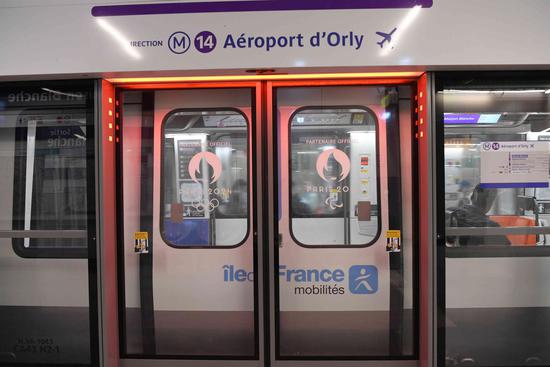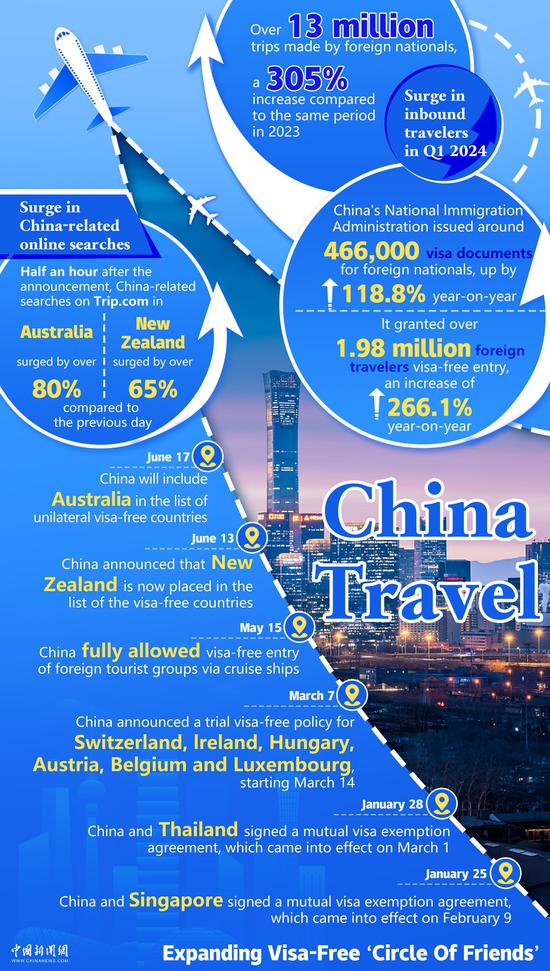Chinese airlines are busily exploring new flight networks at home and abroad as the summer travel season approaches, with flights to Europe becoming a major source of traffic.
On Thursday morning, a plane carrying 213 passengers operated by China Southern Airlines began its maiden flight from Guangzhou, South China's Guangdong Province to Budapest of Hungary.
The new route means China Southern now operates 53 international routes departing from Guangzhou, including 11 routes to Europe.
The launch of this route will help to facilitate trade, tourism cooperation, and cultural exchanges between the two countries, according to an airline representative.
Air China is also increasing its capacity on international routes, as the carrier said on Wednesday that it will launch and resume 13 international routes including launching Beijing-Dhaka and Chengdu-Milan routes, resuming a Shanghai-Barcelona route, and increasing the frequency of flights such as Beijing-Copenhagen and Chengdu-Singapore.
The number of international and regional routes operated by Air China will recover to more than 90 percent of 2019 levels by the end of the year, reaching 114 routes, covering 43 countries and regions across six continents, the airlines said.
Chinese airlines have taken a majority of the market share in terms of current China-Europe routes, per industry data.
Industry data Flight Master showed that, as of June this year, the recovery rate of domestic airlines on the China-Europe route has reached 107.9 percent, compared with 46.4 percent of foreign airlines.
In June this year, the flight volume share of Chinese carriers on the China-Europe routes accounted for 72.4 percent, while the share of foreign airlines was only 27.6 percent.
Notably, there has been no significant change before and after the epidemic in terms of market share between respective carriers from the two regions.
In response to this, the management of some European airlines told the Global Times that global airlines are currently facing delays in aircraft delivery due to component production and supply chain issues, which has also affected the recovery speed of some of the company's international routes.
In addition, the recovery of European airlines on the China-Europe routes has been slower than that of Chinese airlines, which is also related to the need of bypassing Russian airspace, which increasing flight time and costs, according to market watchers.
The expansion of the Europe routes is also an echo of regulator's ambition made earlier this year, as the Civil Aviation Administration of China vowed to recover 80 percent of the international routes this year, while, some airlines have said that their recovery pace is faster than the target.
For instance, Air China has disclosed that the company's international routes are expected to recover to 90 percent of 2019 levels after the third quarter of the year, while China Eastern Airlines has already restored its international flights to approximately 90 percent of the levels from 2019, according to yicai.com.
Meanwhile, Chinese airlines are also busy recovering the domestic flights ahead of the coming travel peak.
Beijing Daxing International Airport forecast that during the summer season from July 1 to August 31 8.8 million passenger trips were likely to be completed, equal to a daily transport of 142,000 passenger trips.
China Southern Airlines plans to increase 1,000 flights to Kashi, Xining and Yinchuan cities, while China Eastern singled out Xinjiang as an important market for the carrier.


















































 京公网安备 11010202009201号
京公网安备 11010202009201号